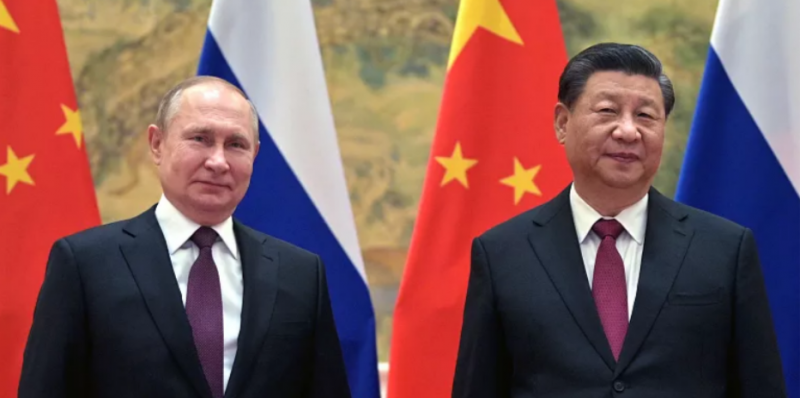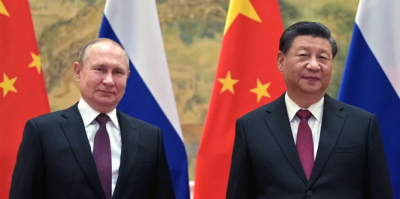Kremlin foreign policy advisor Yuri Ushakov announced today that Russian President Vladimir Putin will discuss the Ukraine conflict with Chinese President Xi Jinping during Xi's official visit to Moscow in a few days, according to the Russian government news agency. Ushakov stated that Russian Defense Minister Sergey Shoigu will participate in the talks with Xi and that "military-technical cooperation" will be addressed during the visit.
Officials from Russia and China confirmed that Xi will visit Russia to discuss the Ukrainian conflict after renewed tensions between Moscow and Washington. Xi's visit to Moscow is a diplomatic achievement for Putin, whose country has been subjected to unprecedented international sanctions since he deployed tens of thousands of soldiers to Ukraine on February 24, 2022.
Beijing and Moscow established a "no-limits" partnership shortly before the invasion, and American and European leaders have expressed concern that Beijing may send weapons to Russia. China denied any such plans and criticized the West for supplying Ukraine with weapons, which are soon expected to include fighter jets after Poland and Slovakia agreed to send jets this week. The Kremlin stated that the jets will simply be destroyed.
A Russian official noted that Xi and Putin will discuss the conflict in Ukraine, along with "military-technical cooperation." Earlier, the Kremlin revealed that "significant" bilateral documents would be signed, without providing further details.
Wang Wenbin, spokesman for the Chinese Foreign Ministry, stated that Xi's visit to Russia, his first in nearly four years, would enhance economic partnerships and promote "peace," although he did not explicitly mention the Ukraine war. China is Russia's most important ally, purchasing Russian oil and other goods that Western nations refrain from buying. China is also one of the largest buyers of Ukrainian grain.
In a separate context, the international agreement allowing the export of grains from several Ukrainian ports on the Black Sea will expire tomorrow, Saturday. Russia has agreed to extend the agreement for 60 days, while Ukraine, the United Nations, and Turkey called for a 120-day extension, with the UN and Turkey mediating the initial agreement.
Russia has not disclosed the specific reason for insisting on a 60-day extension, although it complains that Western sanctions hinder its food and fertilizer exports. The UN office in Geneva stated today that discussions are still ongoing regarding renewing the agreement necessary to prevent a global food crisis, as Ukraine is one of the largest grain exporters. The shortened duration will further restrict Ukraine's exports, which remain significantly lower than pre-invasion levels.
Alessandra Vellucci, a spokesperson for the UN in Geneva, stated during a briefing, "We will not speculate on what will happen tomorrow." China, which has not condemned Russia's invasion of Ukraine, expressed concerns over the intensifying war after two Russian fighter jets intercepted an American surveillance drone, causing it to crash into the Black Sea three days ago, marking the first known direct confrontation between Russia and the US.
The Russian news agency reported that Defense Minister Sergey Shoigu awarded the pilots of the two jets today, in a clear response to White House statements that the incident was reckless and potentially showed incompetence. China has called for peace talks between Moscow and Kyiv, but Russia insists that Ukraine must accept the loss of four regions in addition to Crimea, which Russia annexed by force in 2014.
Ukraine claims that Russian forces must withdraw to pre-1991 borders, the year the Soviet Union was dissolved, and that Moscow will use any ceasefire to rebuild its forces for another attack. Some media reports indicated that Xi will conduct a phone call with Ukrainian President Volodymyr Zelensky after his visit to Russia, but Beijing did not confirm the call.
A spokesperson for Zelensky told Ukrainian media that no agreement has yet been reached on this. Pentagon spokesperson Brigadier General Patrick Ryder told CNN that it is important for China to listen to Ukraine's perspective to understand the implications of its support for Russia.




